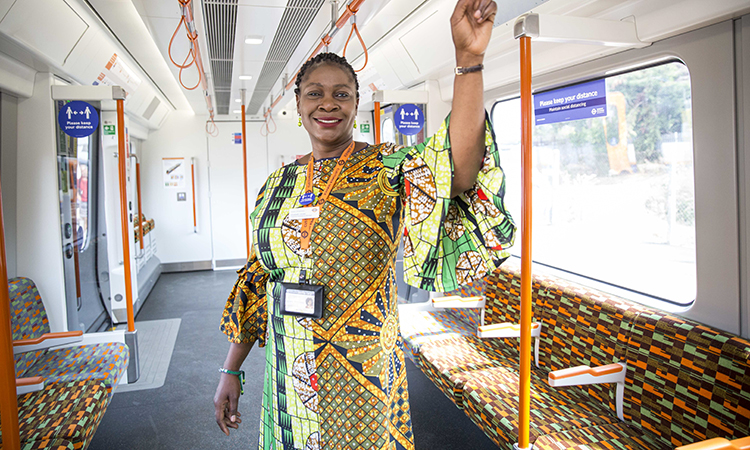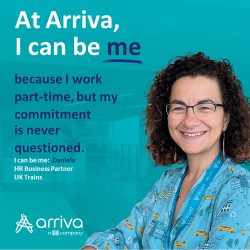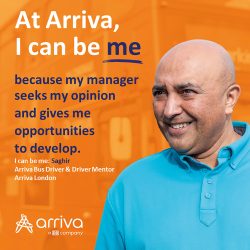Diverse and inclusive workplaces are essential to driving employee commitment
- Like
- Digg
- Del
- Tumblr
- VKontakte
- Buffer
- Love This
- Odnoklassniki
- Meneame
- Blogger
- Amazon
- Yahoo Mail
- Gmail
- AOL
- Newsvine
- HackerNews
- Evernote
- MySpace
- Mail.ru
- Viadeo
- Line
- Comments
- Yummly
- SMS
- Viber
- Telegram
- Subscribe
- Skype
- Facebook Messenger
- Kakao
- LiveJournal
- Yammer
- Edgar
- Fintel
- Mix
- Instapaper
- Copy Link
Posted: 15 December 2022 | Alison O’Connor - Arriva Group | No comments yet
Alison O’Connor, Arriva Group’s Chief People Officer, tells Intelligent Transport about the workforce challenges that companies face across the transport industry and shares her thoughts on the importance of diversity and inclusion in attracting new people to choose public transport as a career, which ultimately benefits society, individuals and businesses.


Credit: Arriva Group - Elizabeth Umoke, Arriva Rail London.
The modern workplace has evolved faster in recent years than at any other time in our history – no business has been immune to change. The global pandemic fundamentally impacted the way that we work and operate – never in our living memory has there been such a phenomenon, re-shaping employment and changing the perceptions of global workforces.
Never in our living memory has there been such a phenomenon, re-shaping employment and changing the perceptions of global workforces”
The economic and political landscape, further fuelled by COVID-19 and the war in Ukraine, have impacted the way that we consume, the way that our supply chains deliver and the cost of commodities like energy. We’ve also seen ongoing global inflation and related wage increases. This, combined with well-known societal issues like ageing workforces, recruitment challenges and people choosing to leave traditional workplaces, mean that all businesses find themselves with a formidable mix of pressures that are expected to affect us for years to come.
In response to all of this, the expectations of the workforce have changed rapidly. We need to understand and take stock of this shift so that we can embrace change and attract and retain wider talent pools and build a more resilient business for the future that reflects the communities that we serve.
Today’s workforce expects more than just a decent pay cheque, they want to work for a company that is trustworthy and has a good reputation; prioritises wellbeing, health and safety; has great working conditions, training and career development; and a supportive and respectful environment with good work/life balance. They also want to work for an organisation that is diverse and inclusive. These workplaces earn deeper trust and enhanced commitment from their employees – and outpace their competitors by respecting individuals’ unique needs, perspectives and potential, as this means that they retain the employees that are talented and committed.
We have recently launched a new group‑wide Inclusion Strategy to ensure a co‑ordinated approach across all of our European businesses, so that all parts of Arriva are aligned behind ambitious and common goals”
Arriva already prides itself on being inclusive, but we also recognise that, as a large and responsible employer of 40,000 people and with a pan-European footprint, there is always more that we can do to build diverse and talented teams that reflect the very varied communities that we serve. This is why we have recently launched a new group‑wide Inclusion Strategy to ensure a co‑ordinated approach across all of our European businesses, so that all parts of Arriva are aligned behind ambitious and common goals.
Why is inclusion important?
Inclusive workplaces are more likely to have diverse teams – and this is a critical component of having a thriving and sustainable business for the long-term. By having more diverse teams, we will embrace different insights, perspectives and experiences. This will, in turn, challenge us to be even more innovative in the passenger transport solutions and services that we provide for our clients and passengers. In addition, a diverse team is going to be much more attuned to the interests and perspectives of passengers and all parts of the communities that we operate within.
Of course, like the rest of the industry, we face recruitment and retention issues – this reflects changing times. If we want to be an industry‑leading organisation, known as a fair and equal employer, a great place to work and an organisation that attracts the best talent, then we need to reach previously untapped talent pools. This is not just good for our business, it’s also good for our passengers and for society as a whole.
For example, our business in Spain is working with organisations that support victims of domestic abuse, while our train operating companies (TOCs) in the UK are working with a social enterprise charity called BEAM that supports homelessness and refugee communities to find work. In other European markets, we are also training ex-military to work with us and, in some cases, we are working with organisations that support ex-offenders. These are all fantastic initiatives which make a huge difference to individual lives, but also create big benefits for society as a whole, while also serving a real business need to recruit more diverse teams. Having a dynamic workplace with a strong focus on inclusion is one of the ways that we can differentiate ourselves.


Credit: Arriva Group – Daniela’s ‘I can be me’ story.
Our Inclusion Strategy is supported by a campaign called ‘I can be ME’, which tries to capture the essence of what it means to work and thrive in a career at Arriva. We’ve collected real stories from Arriva colleagues within the campaign and this will, in time, become a big part of our employer brand as we seek to encourage more people from all walks of life to work for us.


Credit: Arriva Group – Saghir’s ‘I can be me’ story.
It’s vital that existing and future colleagues know that they are able to succeed, regardless of their age, gender, ethnicity or any other characteristic. Our strategy and the supporting campaign are all about making sure that there are no barriers to success and that everyone can expect to work and progress in their careers without prejudice or judgement.
Our vision and values
Our vision to help shape a future where passenger transport is the best choice is underpinned by our values – we care passionately, we do the right thing and we make the difference. We are a people-focussed business – our people are essential to the services that we provide, connecting our customers to schools, jobs and the people that they love.
Our vision to help shape a future where passenger transport is the best choice is underpinned by our values – we care passionately, we do the right thing and we make the difference”
Our Inclusion Strategy sets out a framework and some clear targets related to our workforce, our workplaces, our clients and passengers, as well as how we serve our local communities. Targets will see Arriva Group increasing the number of women and other under-represented groups in senior leader and management positions, including significantly increasing the number of women employed in driver roles. Each country will develop action plans to support the goals.
The new strategy will run up until 2030, by which time we expect:
- 25 per cent of senior leaders and managers will be from under-represented groups
- 50 per cent of senior leaders and managers will be women
- We will have achieved a 100 per cent increase in women drivers across all of our businesses.
I’m proud to see that the new strategy has been launched, so that we can unite behind a clear ambition and make sure that all Arriva employees are able to succeed, regardless of who they are. We need to mitigate against the changing dynamics of workforce expectation and focus on early careers, under-represented groups and being a great place to work. This, in turn, will broaden the skills, perspectives and experiences of our workforce and help us to meet the skill gap in professions – such as engineering and technology – as well as addressing the need for new, different skills and qualifications as we transition to net zero.
I consider myself fortunate to have built a career in transportation. It is true that this sector is often thought of as traditionally male dominated, but this is starting to change. We will accelerate this change by adapting the way that we recruit, the training that we provide and the culture that we nurture. We must meet our goals to continue to be successful long into the future. When I look across Arriva, I see opportunities across all levels for people to thrive – and that’s the way it should be.
Arriva’s strategy has been developed alongside Inclusive Employers1, who are experts in workplace inclusion and work alongside organisations which are committed to prioritising inclusion and creating truly inclusive workplaces.


References


Within Arriva, Alison leads and champions the long-term strategies for HR, talent management, D&I, group communications, stakeholder engagement, health/safety & environment, as well as transport policy and lobbying agendas across the UK and mainland Europe. A graduate in Sociology from the University of York, Alison is also a Chartered Fellow of the Chartered Institute of Personnel and Development (CFCIPD), a member of the British Psychological Society (BPS) and a member of the UK&I leadership team and governing body for the Chief Human Resources Officers Community (CHRO).
Related topics
Public Transport, Staff & Skills Development, Workforce Inclusivity, Workplace
Issue
Issue 4 2022
Related modes
Bus & Coach, Rail
Related organisations
Arriva Group
Related people
Alison O’Connor








